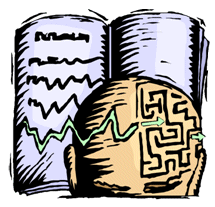

As a teacher of young children, as well as a parent, one understands that anyone can learn to read phonetically, but its more about comprehension that just words. those with learning disabilities, must early-on sort them out and get needed help. All of life is about consciousness and understanding especially as our awareness expands on all levels. As a race, we are making great strides in all directions.
With reading this goes to one's interesting in what is read, learning disabilities, language issues, background on the topic, evolving consciousness, other. We tend to zone out when reading things that don't interest us or cannot be applied to our lives at that moment. Our grid matrix for experience is not connecting. Rereading things after one has had experiences in life, creates magic with the words and a new light of understanding. This is why people go on metaphysical journeys to get there. It's all in your DNA code, the way your brain is wired.

PhysOrg.com July 3, 2006
Ever read the same paragraph three times? Or get to the end of a page and realize you don't know what you just read? That's mindless reading. It is the literary equivalent of driving for miles without remembering how you got there, something so common many people don't even notice it. In a new study of college students, researchers from the University of Pittsburgh and the University of British Columbia established a way to study mindless reading in a lab. Their findings showed that daydreaming has its costs. The readers who zoned out most tended to do the worst on tests of reading comprehension, a significant, if not surprising, result.
The study also suggested that zoning out caused the poor test results, as opposed to other possible factors, such as the complexity of the text or the task. The researchers hope their work inspires more research into why zoning out happens, and what can be done to stop it. For now, they want the problem to be taken seriously. It's so ubiquitous. Everybody does it. I think that's one of the main reasons it's been overlooked.
The students said as their eyes scanned the words, their minds often were elsewhere. They were hungry, or thirsty, or tired. They were thinking about plans, worries or memories. Some drifted into fantasies. Others stuck with the book, but their minds wandered into tangents about the plot. Karen Wixson, a nationally recognized reading expert and professor of education at the University of Michigan, cautioned not to read too much into all this.
"This is a long ways away from having implications for reading instruction," Wixson said. "It could, eventually, down the line. But to draw inferences about this as a contributing factor toward reading comprehension would be a huge, huge leap." To apply to younger kids, the target audience of reading classes, the findings would have to be replicated among school-age children, Wixson said. She said participants may have zoned more often because they were reading off computer screens, and because they had no real incentive to pay attention, as they would in school.
But at the International Reading Association, Cathy Roller sees some direct payoff. She directs research and policy for the association, which represents literacy professionals. By recognizing zoning out as problem, she said, teachers can do something. Like asking students to put a checkmark next to paragraphs as they finish them and then summarize what they just read. Or having students scan all the pictures and bold type before reading the text of a story, so that they have a general understanding of what's to come.
Zoning out may simply mean that the prose isn't interesting, Roller said. But it could also be a clear signal that students don't understand the work. You don't want to generalize narrow studies into large implications. But zoning out is probably not a whole lot different than not comprehending. And telling people to start using some good comprehension strategies is not likely to do any harm. Roller knows. She had just been zoning out while reading a literature review. By the way, last sentence here. If you missed anything, there's no shame in rereading.